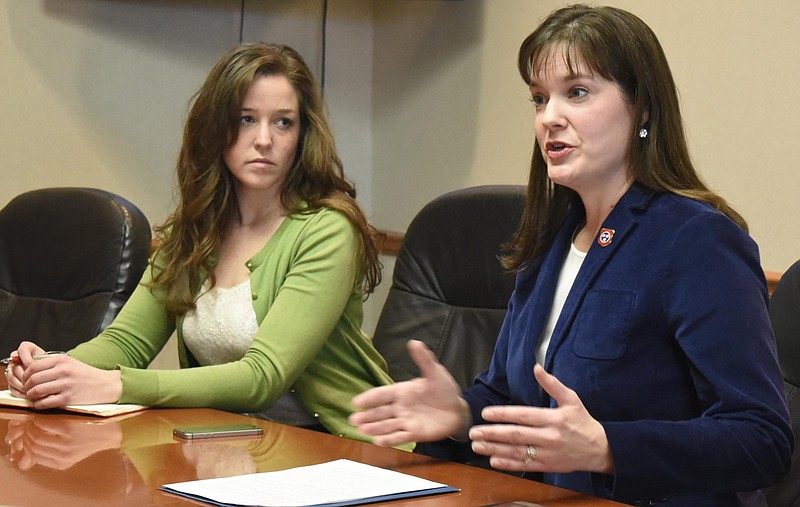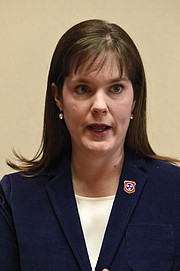Photo Gallery
State wants to work collaboratively to improve Hamilton County's lowest-performing schools
But what we can't do is to continue to let schools be unsuccessful.
As the state works on how to intervene in five of Hamilton County's lowest-performing schools, Tennessee Education Commissioner Candice McQueen is urging the community and school district to be involved in the process.
"It would be unfortunate if we didn't take the opportunity for collaboration," McQueen told the Times Free Press during a visit to the newspaper last week.
In coming weeks, McQueen plans to meet with Hamilton County Schools, education stakeholders and elected officials to discuss strategies for improving schools. Placing the district's lowest- performing schools in the state-run Achievement School District remains a possibility, but McQueen said other options are on the table as well.
She said the state has learned from previous ASD interventions and is reluctant to come in and force things upon districts. The state might need to lead the vision here in Hamilton County, she said, but everyone needs to work together to make progress in low- performing schools.
"This is a moment where the community has to look at options and opportunities," McQueen said. " Let's be good-will people, come to the table, look at those options and say, 'What's going to be the best way for our community to serve all kids?'"
Jill Levine, chief academic officer for Hamilton County Schools, said the district is invested in helping schools be successful.
"We applaud Commissioner McQueen for adopting a collaborative approach," Levine said, adding that the district is willing to discuss the options.
Interim schools Superintendent Kirk Kelly said he would be glad to work with the state.
"We need additional help. It brings more resources to the table," Kelly said. But he said he doesn't want to lose students to the ASD.
Over the past four years the state has pumped more than $11 million into Brainerd High, Dalewood Middle, Orchard Knob Elementary, Orchard Knob Middle and Woodmore Elementary - they are referred to as priority, or iZone, schools because they rank in the bottom 5 percent of schools statewide. Still, McQueen said, the schools have not made expected progress.

"It's our responsibility legally and it's our responsibility morally to say, 'We need to look at what the next stage of work is here,'" McQueen said.
More than a year ago the state warned former superintendent Rick Smith the iZone schools were not making expected progress. A state report detailed the lack of academic progress over the previous three years and placed the blame squarely on the district's leadership.
The report also said the district failed to spend more than $1 million during the three-year grant cycle.
McQueen said Kelly has tried urgently to use those remaining funds this school year. But, she added, the lack of progress since 2012 means all five schools qualify for rigorous intervention. And more Hamilton County schools are expected to be added to the priority list this summer after test results are released.
Levine said she just wants the district to have more time to work in the schools. She said if the new district leaders had three years to implement its strategic plan it could bring progress. Turning over students to the ASD, which historically has not posted strong results in Shelby County and Metro Nashville, is concerning, Levine said.
"We would much prefer to be responsible for the progress of those schools and those students and keep them under our care and direction," she added.
McQueen said if schools are not placed in the ASD, the options are closing the schools, allowing the district to work with a charter operator, or giving the district one more year to make significant academic gains before the ASD intervenes.
McQueen said individual schools might have different options based on their capacity, support and history.
"But what we can't do is to continue to let schools be unsuccessful," she said.
The state said decisions will likely come "sooner rather than later," and before school starts in the fall. The schools will have the coming year to plan for intervention that will be implemented in the 2018-19 school year.
Hamilton County Schools should continue investing in these schools and their students, McQueen said, and not pull out support. The state will provide additional money and resources during the planning year, as well as staff who will work with the district to analyze problems and identify strategies for the future.
"The planning year can really set up schools for success," McQueen said.
But Kelly said the planning year will be difficult for the district if the school is going into the ASD.
"It makes it a little bit harder in some cases to recruit people that want to [teach] in that school," he said, adding teachers know that after the planning year they would have to reapply for a job with the ASD.
No matter what intervention a school receives, McQueen hopes to find local talent to lead and teach in each one.
"Our intent is not to bring in a leader from New Mexico, our intent is to cultivate a leader here to do the work," she said.
She knows the interventions may be controversial but hopes everyone works together, owns the problem and agrees improving these schools is what's right for kids.
Contact staff writer Kendi A. Rainwater at krainwater@timesfreepress.com or 423-757-6592. Follow on Twitter @kendi_and.

